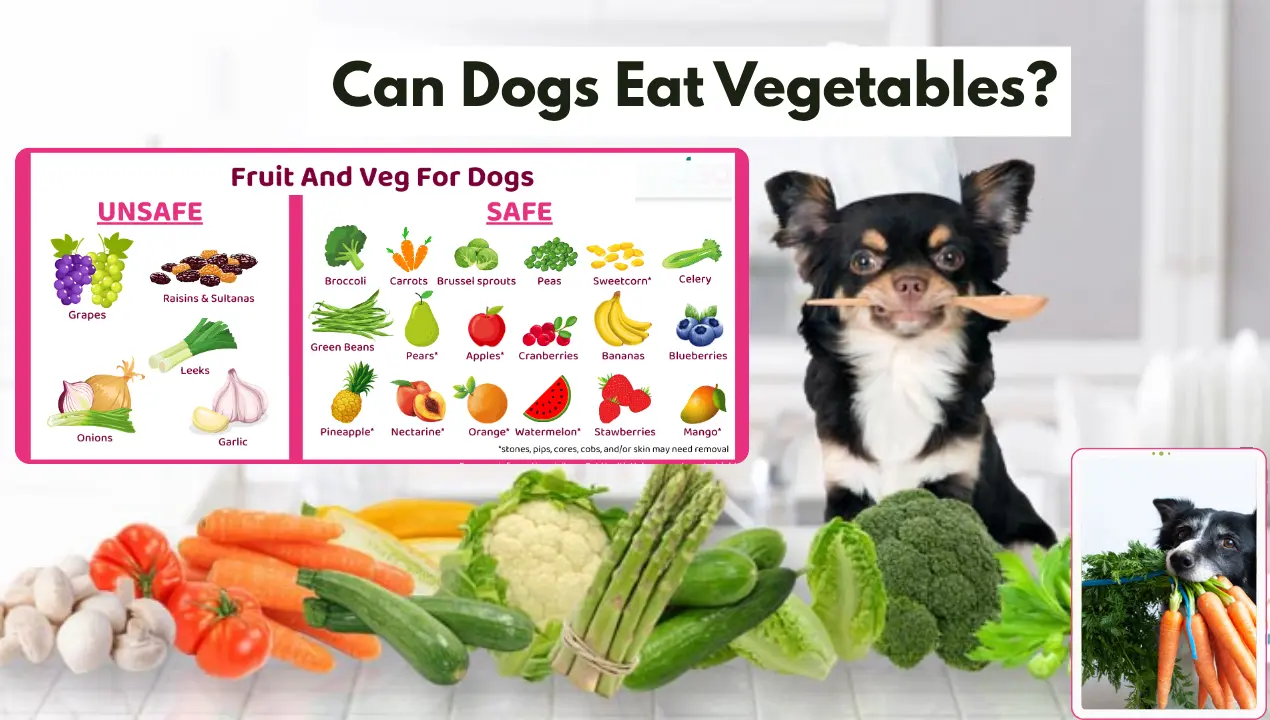Dogs are curious eaters—and as a pet parent, you might wonder: Can dogs eat vegetables? The answer is yes, but with caution. Vegetables can offer important health benefits for dogs, but not all veggies are created equal. Some are nutritious and safe; others can be harmful or even toxic.
What Vegetables Can Dogs Eat?
Many vegetables are not only safe but also beneficial for dogs when fed correctly. Here are some top choices:
Safe Vegetables for Dogs:
- Carrots – Low in calories, great for teeth.
- Green beans – Rich in fiber and iron.
- Sweet potatoes – High in beta-carotene and fiber.
- Cucumbers – Great for hydration and low in calories.
- Zucchini – A good source of potassium and Vitamin C.
- Broccoli (in moderation) – Contains fiber and Vitamin K.
Each of these vegetables provides specific health benefits, from aiding digestion to supporting immunity.
According to the American Kennel Club (AKC), carrots and green beans are among the safest and most commonly recommended vegetables for dogs.
What Vegetables Can Dogs Not Eat?
Some vegetables can be harmful to dogs and should be strictly avoided:
Unsafe Vegetables:
- Onions – Can cause anemia and damage red blood cells.
- Garlic – Similar to onions, it’s toxic in even small amounts.
- Leeks and chives – Also part of the allium family, unsafe for dogs.
- Mushrooms (wild) – Many are toxic and can cause serious harm.
- Raw potatoes – Contain solanine, which is toxic to dogs.
According to the Pet Poison Helpline, foods from the allium family (onions, garlic, leeks) are among the top causes of poisoning in dogs.
Can Dogs Eat Vegetables and Fruits?
Yes, many fruits and vegetables are safe for dogs, but always check each item individually.
🍎 Fruits Dogs Can Eat:
- Apples (no seeds)
- Blueberries
- Bananas
- Watermelon (seedless)
- Strawberries
Check out our full guide: Fruits and Vegetables Dogs Can or Can’t Eat
Fruits & Vegetables Dogs Should Avoid:
- Grapes and raisins (toxic)
- Avocado (contains persin)
- Tomato leaves and stems (contain solanine)
Can Dogs Eat Vegetables Every Day?
Yes, dogs can eat vegetables daily, as long as they are balanced with other dietary needs. Vegetables can provide key nutrients, fiber, and hydration.
Tips for Daily Feeding:
- Rotate between dog-safe vegetables
- Use them as low-calorie treats
- Limit total veggies to 10–15% of daily food intake
Always talk to your veterinarian before introducing any long-term diet changes.
Can Dogs Eat Vegetables and Carrots?
Absolutely. Carrots are one of the best vegetables for dogs.
Benefits of Carrots for Dogs:
- Promote dental health
- Low in fat and calories
- High in fiber and Vitamin A
You can feed carrots raw (chopped) or steamed.
Can Dogs Eat Corn?
Yes — in moderation. Plain, cooked corn (not on the cob) is safe for dogs. But corn cobs can cause choking or intestinal blockages.
According to PetMD, corn is used in many dog foods but should be portioned carefully.
How to Prepare Vegetables for Dogs
Always wash vegetables thoroughly and prepare them safely:
Safe Prep Methods:
- Steamed (softens fiber, retains nutrients)
- Raw (for carrots, cucumbers)
- Mashed (for older dogs with dental issues)
- Frozen (great for teething or hot days)
Avoid:
- Adding salt, spices, butter, or oil
- Using canned vegetables with added preservatives
Fruits and Vegetables Dogs Can Eat List
| Safe Veggies | Unsafe Veggies | Safe Fruits | Unsafe Fruits |
|---|---|---|---|
| Carrots | Onions | Apples | Grapes |
| Green Beans | Garlic | Bananas | Raisins |
| Sweet Potatoes | Raw Potatoes | Blueberries | Avocado |
| Cucumbers | Mushrooms (wild) | Watermelon | Tomato stems |
| Zucchini | Leeks, Chives | Strawberries |
Best Vegetables for Dogs
Conclusion
So, can dogs eat vegetables? Absolutely — with proper preparation, portion control, and safe choices, vegetables can be a fantastic addition to your dog’s diet. From crunchy carrots to fiber-rich green beans, these natural foods offer valuable nutrients without the added fillers of processed treats.
Just remember: not all vegetables are safe for dogs. Stick to trusted options like cucumbers, sweet potatoes, and zucchini, and avoid dangerous ones like onions and garlic. Always introduce new foods gradually and consult your vet if you’re unsure.
With the right knowledge, you can confidently include vegetables in your dog’s meals — boosting their health, happiness, and longevity.
FAQ
Can dogs eat carrots?
Yes, carrots are one of the healthiest vegetables for dogs. They help with dental health, digestion, and weight management.
What veggies can dogs eat daily?
Safe daily vegetables include carrots, green beans, zucchini, sweet potatoes, and cucumbers. Serve in moderation.
What vegetables can dogs not eat?
Avoid onions, garlic, leeks, wild mushrooms, and raw potatoes. These can be toxic to dogs.
Can dogs eat vegetables and fruits?
Yes, but check each item. Safe fruits include apples (seedless), bananas, blueberries, and watermelon.
How should I prepare vegetables for dogs?
Steam or chop raw. Avoid seasoning, salt, or oils. Do not feed canned vegetables with added sodium.
Read more:

